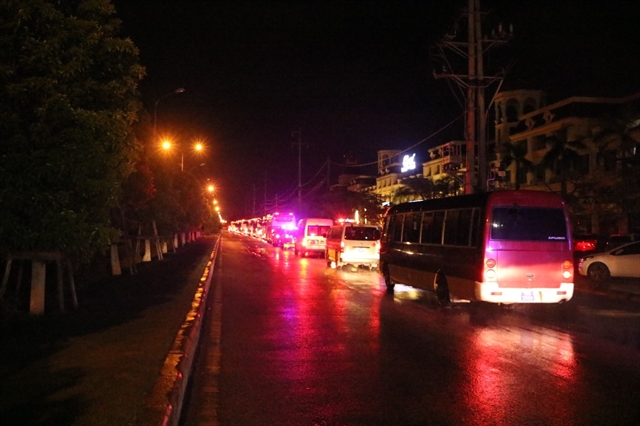 Society
Society

More than 380 Chinese nationals allegedly involved in a major hi-tech gambling ring in the northern city of Hải Phòng were taken early Thursday morning to the Hữu Nghị International Border Gate in Lạng Sơn Province to be returned to Chinese authorities.

|
| Buses carrying more than 380 Chinese nationals involved in a gambling ring leave the Our City urban area in Hai Phong for Lạng Sơn Province's Hữu Nghị International Border Gate. — VNA/VNS Photo Minh Thu |
HẢI PHÒNG — More than 380 Chinese nationals allegedly involved in a major hi-tech gambling ring in the northern city of Hải Phòng were taken early Thursday morning to the Hữu Nghị International Border Gate in Lạng Sơn Province to be returned to Chinese authorities.
Police found the Chinese nationals last Saturday in the Our City urban area on Phạm Văn Đồng Street in Hải Phòng's Dương Kinh District.
The Ministry of Public Security worked with the Hải Phòng police to arrange transport of the group by bus to the border gate at 3am on Thursday.
On Saturday, police raided the residential Our City urban area and discovered the suspects as well as 20 servers and hundreds of client computers that had been carefully hidden in different rooms.
Police said the items were likely used in the ring's cross-border gambling, sport betting and lottery betting activities.
The police seized 530 computers and nearly 2,000 smartphones as well as bank cards, cash and several files.
According to the initial investigation, transactions of the group totalled about RMB3 billion (US$435 million).
The suspects, aged 18-24, had been hired at $435 per month to work for the ring after entering Viet Nam as tourists, according to police.
Divided into small groups, they took turns working shifts and were not allowed to go outside.
All of their activities took place within the Our City urban area, which was built in 2012 by a company from Hong Kong. It consists of five apartment buildings and one large commercial centre.
Police said it had been difficult to uncover the ring because the group had chosen an isolated, self-contained new urban area to avoid scrutiny by residents and local authorities.
Only a few members declared a temporary residence to police, while the others told police they had been staying at local hotels to avoid being monitored.—VNS




